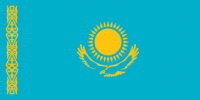Kazakhstan: New Labor Unrest in Zhanaozen
Rédigé par admin - - aucun commentaire
Five years ago, beefs over pay, labor rights and union activity sparked a protracted strike in Zhanaozen’s oil sector that climaxed with the deaths of 16 civilians in clashes with police.
“History is repeating itself,” sighed Sagintay, an oil worker speaking under a pseudonym, as his colleagues nodded vigorously in agreement. “In 2011, there was a strike five years ago. This is exactly the same.”
While there are parallels between the 2011 dispute and the strike that erupted last week in Zhanaozen, there are also crucial differences. Five years ago, the strike rapidly fanned out across several state-owned oil firms, placing the government at the center of the dispute. For now, at least, this strike is confined to a single, privately-owned well-drilling company. In addition, economic conditions are different. The labor unrest these days is taking place against a backdrop of an economic downturn in Kazakhstan.
“They have the right to elect a new leader, but the employer is interfering in that right,” complained a Bekkaliyev supporter and employee of the union, whose work, members said, was paralyzed because of the dispute, its offices sealed and its accounts frozen.
This is the second strike at Burgylau within two months. In late July, workers downed tools in protest at their hours, and their salaries by extension, being slashed by half, in response to a downturn in Kazakhstan’s energy sector caused by low global oil prices.
Company executives explain there simply was not enough work because of the oil-sector slump, but they backtracked after workers went on strike, reinstating their hours at full pay.
Some strikers are now demanding back pay for the two months they worked half-time, but the main salary demand is that the pay calculation system be brought in line with that used by the national state-owned energy firm KazMunayGaz.
Workers at Burgylau believe employees of OzenMunayGaz, a KazMunayGaz subsidiary and the main employer in Zhanaozen, receive higher salaries than they do, although several workers from both companies queried by EurasiaNet.org cited similar ballpark figures for their current salaries, of around 300,000 tenge ($900) per month, which is double the national average salary of 142,000 tenge.
The dispute highlights an uncomfortable fact – one that workers seem reluctant to accept: the country’s oil companies are experiencing tough times because of the worldwide price crash. Given the drastic decrease in business, the company has much less flexibility on the issue of pay than it might have a few years ago, when energy prices were still high.
Last year, drilling for new wells – Burgylau’s prime business – dropped by 40 percent and it will fall another 50 percent this year, Aset Magauov, the deputy energy minister, said in July.
As Astana struggles to address the economic slump, it is eager to prevent the industrial unrest from spreading.
So far, there is no sign of other oil workers in Zhanaozen downing tools in solidarity with the Burgylau drillers. “We haven’t taken any interest in what’s happening there,” one OzenMunayGaz employee said. “We don’t need another strike. What we need is peace and quiet and stable salaries.”
Copyright © eurasianet
